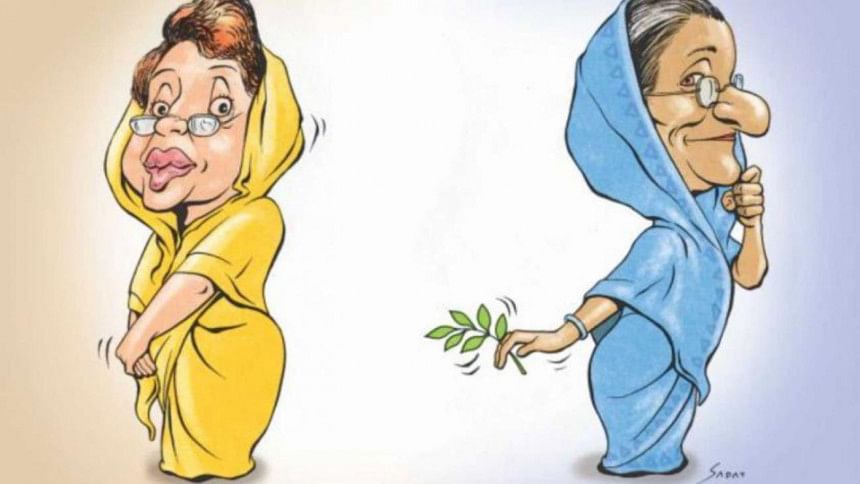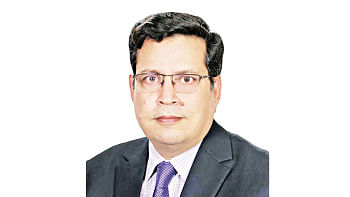A ceasefire between the battling Begums!

New realisations appear to be dawning on the leadership of Bangladesh Nationalist Party (BNP), especially on its chairperson Khaleda Zia. The latest indication of an apparent change of heart is the party avoiding any knee-jerk reaction over the confirmation of death sentence by the highest court against its senior leader Salahuddin Quader Chowdhury. BNP has not called for hartal.
Once wired up to call hartal on almost any pretext, BNP lets go of a more serious reason to make an impulsive announcement of protest against Salahuddin's turn of fate. The party merely reacted in a soberly worded statement saying, it was 'upset, surprised, aggrieved and shocked' by the verdict.
What a sea-change has come over BNP, by past standards! The party's stock argument against opting out of hartal and oborodh had been that it had its back against the wall so it had no alternative but to go for them. Now by a twist of fate, when the party has indeed its back to the wall it is doing the exact opposite: religiously keeping out of violent political programmes. Actually, it is as well that they are doing it and should continue to do it; for, the bloody and burning orgies carried out by them isolated them from the general masses. Besides, their violent politics with Jamaat as its spearhead corroded the credibility of the senior partner.
Another twist in the tale is that where previously Sheikh Hasina wanted to draw Khaleda Zia into elections on her terms, now it is the latter who is trying to draw the Prime Minister into calling a snap election.
The underdog image or martyr complex that BNP wanted to cultivate with the people in the face of 'persecution' couldn't work to their advantage because serious blunders had been stacked against the party's image.
And Khaleda Zia admitted to some of the major follies in hindsight, one wished if such faltering had been averted by her in real time. First, the BNP chairperson regretted, according to some reports, that she did not respond to Sheikh Hasina's telephonic invitation for talks citing that she was occupied with a pre-announced political programme. But wasn't talking, a part and parcel of politics, clearly more important than a violent partisan programme? Secondly, when Sheikh Hasina put forward a 5 plus 5 BNP-AL formula of representation in the interim government headed by the incumbent PM, this too was dismissed out of hand. The final nail was driven in the coffin by the BNP's refusal to participate in the January 5 polls in spite of a fair chance of its good showing. Our point is, at least, BNP could have tested the bona fides of the AL on its overtures rather than perpetuating distrust in national polity.
As reported in a prominent Bangla daily, Khaleda Zia went conciliatory to a point where she asked, "Why should we not be seeing each other's face; we should be talking like we once did to craft the changeover from the Presidential to the Parliamentary form of government?"
Khaleda has been out of power for eight years with another four years in prospect. Holding BNP together would be challenging given that our party politics is sustained on a patron-client relationship. BNP out of power lacks in such gelling chemistry. In contrast, AL having remained out of power for 21 years, held its ground because of strong ideological moorings and grassroots base. In power, it has the added advantage of a patrimony.
In this context, AL is under no pressure to call a mid-term election, even though there are occasional feelers that the party might go for it to consolidate its position and establish its legitimacy. The scheme of things should have space for a strong constructive opposition party so that Bangladesh takes its place with other advancing democracies in the world.
BNP needs an add-on to its new set of self-realisations, which is this: Let Khaleda Zia refrain from celebrating her birthday on August 15, an affront to the solemnity of mourning the assassination of Bangabandhu Sheikh Mujibur Rahman.
The writer is Associate Editor, The Daily Star.

 For all latest news, follow The Daily Star's Google News channel.
For all latest news, follow The Daily Star's Google News channel. 



Comments